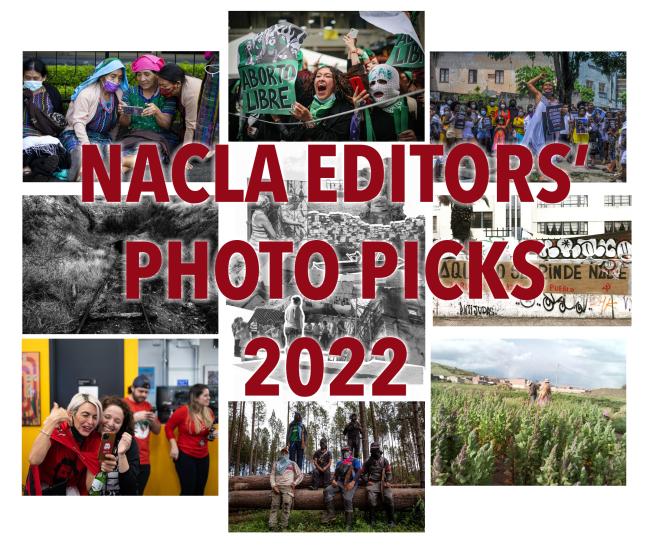
Support our work to help us bring you more quality analysis and reporting in 2023.
In addition to NACLA’s original reporting and analyses, photojournalists contribute original photography to our coverage, providing glimpses of the people and places behind the stories. This year, that has included protests in Colombia and Brazil, the work of Brazilian diaspora campaigners in the United States, mining in Mexico, scenes of rural Peru where rising food insecurity threatens campesinos’ way of life, and street art proclaiming support for the Chilean constitutional plebiscite in September.
Here is a list of our top photos of the year. Support our work to help us bring you more quality analysis and reporting in the new year.
Colombia | February 2022
Daniela Díaz
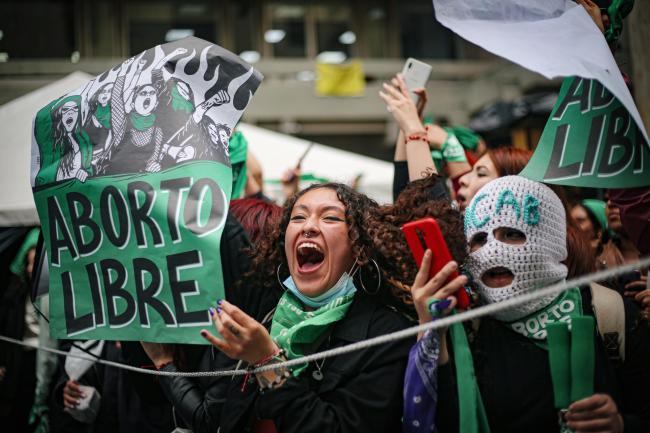
On February 21, Colombia became the third country in just over a yearjoining Mexico and Argentinato decriminalize or legalize abortion. Legalizing termination up to 24 weeks of gestation makes the policy one of the most progressive in Latin America. Here, demonstrators celebrate the verdict.
Guatemala | February 2022
Roderico Y. Díaz
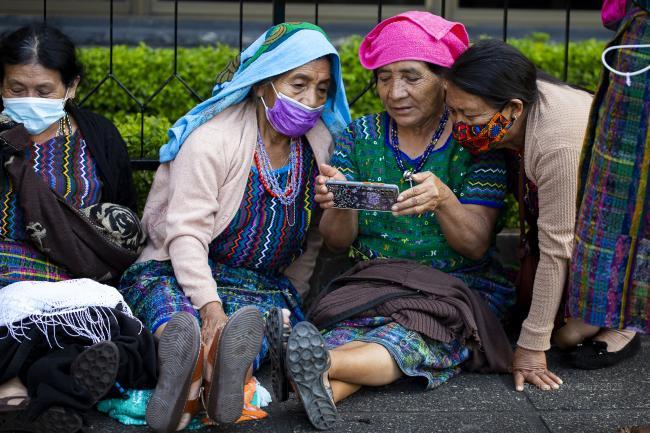
After over a decade of court battles spearheaded by 36 Maya Achí survivors, a special tribunal convicted five former paramilitary soldiers of crimes against humanity on January 24. Each of the convicted were sentenced to 30 years in prison for acts of sexual violence committed in the early 1980s during the internal armed conflict in Guatemala (1960-1996). The verdict set an important precedent, highlighting the intentional use of sexual violence as a military strategy. Outside the court building, these Achí women watched the transmission of the trial on a cell phone.
Colombia | May 2022
Antonio Cascio
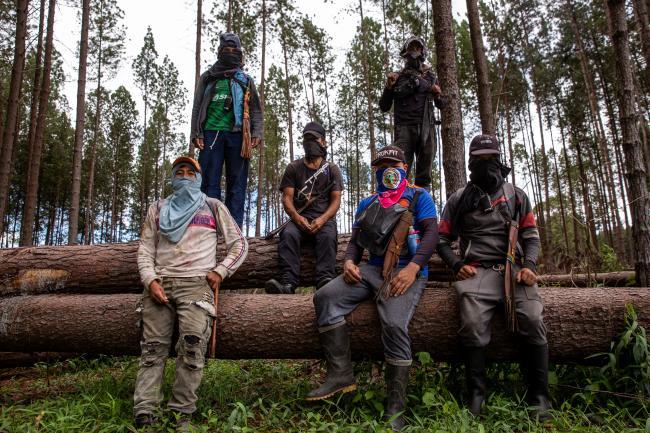
On July 27, 2021, the Misak Indigenous community, together with campesinos from the region, occupied multinational paper giant Smurfit Kappa’s pine and eucalyptus plantations in Cauca, Colombia, denouncing land-grabbings carried out by the company, the environmental damage caused by the plantations, and the government’s failure to distribute land in compliance with the 2016 peace treaty. State forces and company workers have responded with violent attacks. A group of the “Pubenenses” (Indigenous guard) pose for a picture on a tree that they cut down in protest.
Brazil | March 2022
Felipe Iruatã

During an early morning invasion on March 1 in Gamboa de Baixo, a coastal community in Brazil’s northeastern city of Salvador, the Bahia state military police executed three young Black people: 16-year-old Patrick Sapucaia, 20-year-old Alexandre Santos dos Reis, and 22-year-old Cleberson Guimarães. Gamboa de Baixo is one of the few Black communities occupying the coastal lands of the Bay of All Saints, where, over the last 30 years, luxury apartment buildings and yacht clubs have replaced traditional fishing villages, destroying housing, local customs, and human lives in the process. Here, residents of Gamboa de Baixo in Salvador, Brazil demand justice for Patrick, Alexandre, and Cleberson.
Chile | August 2022
Bree Johnson
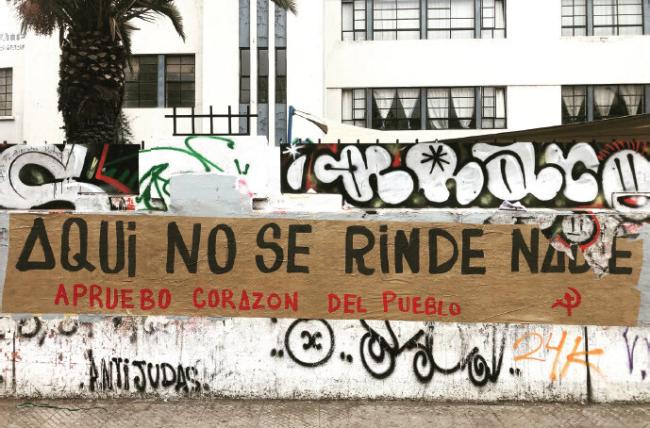
In the months prior to the September 4 plebiscite to approve or reject Chile’s new draft constitution, the propaganda war simmered on the streets of Santiago. Above, a banner reading “Here, nobody gives up. Apruebo, heart of the people,” in support of the Apruebo (approve) vote. After the 2019 uprising and the launch of a Constitutional Convention, the dream of replacing the dictatorship-era constitution finally felt tangible for many. But ultimately, conservative forces aligned behind the Rechazo (reject) campaign engaged in a war of disinformation and destruction, tearing down or defacing Apruebo propaganda throughout the country and winning the plebiscite by an unexpectedly large margin.
Mexico | September 2022
Omar Ballesteros

On August 3, ten miners who entered a coal pit mine, like the one pictured above, were trapped and killed in a mining accident in Sabinas, a small city in Mexico’s coal region, the northern state of Coahuila. Over 60 percent of Mexico’s mining accidents occur in Coahuila, where labor abuse and lack of accountability are longstanding practices. In response to the recent incident, families of the trapped workers created Organización Familia Pasta de Conchos to fight for miners’ rights.
Latin America | September 2022
Colectivo TRAMA (Atailon Matos, Flora Tavares, Luisa Caria, Lucas Ribeiro, Marina Muniz, Marina Novaes, Matheus Tanajura, Zara Rodrigues)

Around the region, the violence of mass evictions and homelessness has led to the emergence of vibrant social movements aimed at transforming how we conceptualize ideas such as “the right to housing” and “the right to the city” as fundamental aspects of citizenship, belonging, and justice. Created for our Fall 2022 issue of the NACLA Report, “Fighting for Housing Justice in the Americas,” this photo collage features photos from the issue, which explores the current housing crisis in Latin America and the Caribbean.
Peru | September 2022
Hilda B. Manzano Chura

In Pichacani, in Peru’s southern province of Puno, many are struggling with the rising costs of living. Many small farmers rely on traditional food systems to confront the food crisis, but recent price increases in food and fuel represent an additional stress for families just emerging from the hardships of the pandemic. Here, small farmers cultivate quinoa, which, when there is a good harvest, can provide an important source of nutrition and additional income to cover household expenses.
United States | November 2022
Guilherme Henrique

Diaspora supporters celebrate the victory of former President Luiz Inácio Lula da Silva in Brazil’s presidential elections on a video call with fellow campaigners in Brazil. For much of the race, polls showed Lula with a double digit lead over incumbent Jair Bolsonaro. But after a surprisingly close race in round one, the two waged a bitter runoff, cultivating in the second round of voting on October 30th. Ultimately, Lula’s margin of victory was less than two points. In such a tight race, every vote counted and the work of activist groups in the United States, like those celebrating here, helped weaken Bolsonaro’s foothold amongst the Brazilian diaspora in the United States.

